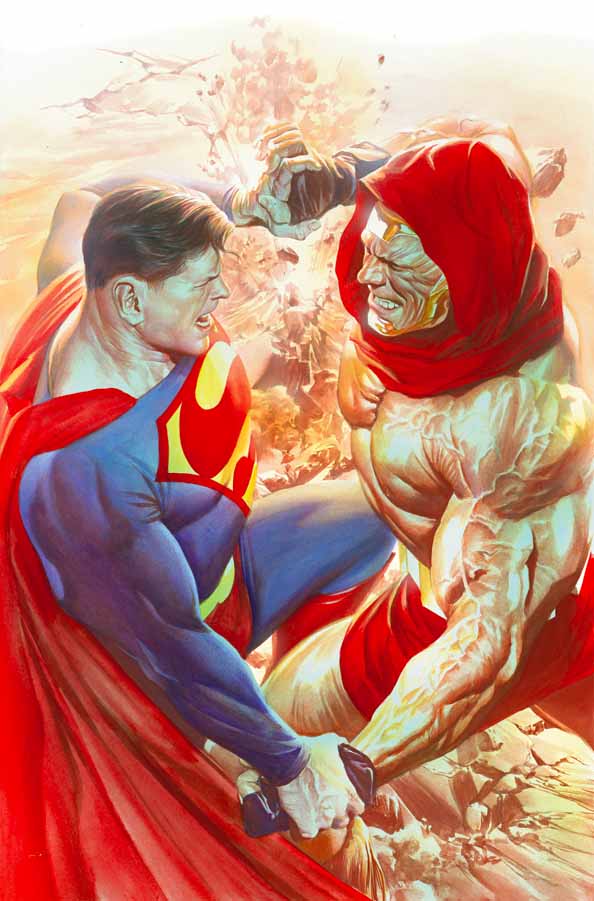Justice Society of America Annual #1 Review
 Writer: Geoff Johns
Writer: Geoff JohnsPenciller: Jerry Ordway
Finally, after twenty-two years, we get to revisit Earth-Two. I know a lot of people don't remember Earth-Two anymore. I barely do. In fact, I got my first ever superhero comic in a loot bag at another boy's eleventh birthday party. It was Crisis on Infinite Earths #12. The experience was absolutely mindblowing. Shadow demons attacked the one remaining Earth. Heroes I'd never heard of (and a couple I had) were dropping like flies. A huge battle occurred in space against the evil Anti-Monitor. As my comic book journey began, one ended in that book. The last of the doppelgangers apparently died off, including Superman, Robin, Green Arrow and Huntress of Earth-Two and Superboy of Earth Prime, and, despite their deaths, I read everything about them I could (no small chore before the internet). I have a special fondness for the Multiverse, and when I saw that Earth-Two was reformed at the end of the series 52, I was thrilled.
This book is the first story set on Earth-Two, and it was by-and-large a very strong one. It centres on the Huntress, the daughter of Earth-Two's Batman and Catwoman, and her experiences following the Crisis. After the death of her father and the departure of Robin, the Joker has apparently taken to systematically destroying her life. In this book he has seriously disfigured her boyfriend, Harry Sim, just as she was about to reject his marriage proposal, and she decides it is time to kill the Joker. She is seriously conflicted since she is in love with Robin, but cannot declare her love now that her boyfriend is in the hospital. Power Girl, who apparently forgot to use her superspeed, fails to stop her attacking Joker, but he commits suicide right before Huntress can land the killing blow, thus "getting the last laugh" so to speak, knowing that he turned her into a killer while not actually letting her have the honour.
Unfortunately, aside from Robin and Huntress, we don't get to meet many of the other characters that made Earth-Two unique. Jade, Doctor Fate and the Specter are there, but the original Flash and Green Lantern are apparently retired and don't appear. In fact, one of the things that this book makes clear is that the merger of Earths-One and Two actually did a very good job of continuing many of the best elements of Earth-Two in the mainstream books. What we're left with is a collection of dated superheroes that have been successfully developed in JSA and other books. In a weird way, Earth-Two, which had mostly its own heroes with a few doppelgangers has now turned into a world consisting almost entirely of doppelgangers, and is less interesting for it.
I was disappointed, too, with Power Girl's reaction to Earth-Two. Power Girl, who is the cousin of Earth-Two's Superman, has always felt somewhat out of place since Earth-Two was largely destroyed after Crisis on Infinite Earths. However, despite that being a part of her personality, there is only one brief moment where she seems happy that she might have found her own Earth. After being hissed at by an angry cat, she quickly tells the Huntress, who was her best friend, "I don't feel like we're friends anymore", which was pretty heartless on any scale. Do they not have tact on Earth-One? After literally decades of Power Girl's feelings of displacement, she doesn't really make much of an effort to fit in when she discovers her putative long-lost friends. Her response really didn't seem consistent with the character.
Of course, all is not as it seems, and Skrull Power Girl (wearing a more modest costume) shows up, reminding the Huntress of a personal conversation, and the Justice Society attacks Power Girl. Okay, she's probably not a Skrull, given that there are no Skrulls in DC comics, but she sure acts like one and her timing is a little too convenient. I do hope it turns out the Skrull Power Girl is the imposter, so that the real Power Girl's feelings about Earth-Two can develop some more before Earth-Two is blown up in the next crossover.
Despite these problems, it really is wonderful to see Earth-Two again, and I hope they can tell as many JSA stories as possible on this Earth. It is, after all, the home of most of the cast of the book, and provides a wonderful context in which to tell stories about what the JSA is all about. Moreover, the character of the Huntress is very interesting, and I want to see more of her and find out more of her story.
B
Labels: Justice Society of America
















